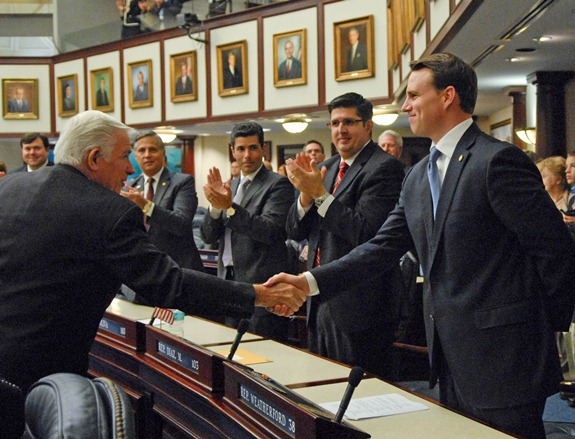
A trial over whether the Florida Legislature broke state redistricting laws came to end this week. (Photo via myfloridahouse.gov)
By Ashley Lopez
Florida Center for Investigative Reporting
The 12-day long trial over whether GOP leaders in the Florida Legislature broke the law when re-drawing congressional maps in 2012 ended this week. After days of lengthy questioning, there are still some unanswered questions, though.
Mainly, we still don’t know who submitted a map that was eventually used to draw some final districts. At first, the map was thought to belong to Alex Posada, a Florida State University student. But, as the trial progressed, Posada claimed the map wasn’t his and his name was used on that map without his permission. Even though the trial has come to an end, we don’t know if someone broke the law and stole Posada’s identity.
According to The Miami Herald/Tampa Bay Times:
…When it comes to the authorities in charge, none of them — all Republicans — is calling for a separate criminal investigation into identity theft or the prospect that someone lied.
“We are not going to comment during the ongoing trial. We are in the middle of litigation and are letting the process continue,” said Ryan Duffy, spokesman for House Speaker Will Weatherford, R-Wesley Chapel.
“As this is ongoing litigation, which our office is not involved in, it would not be appropriate to comment at this time,” said Jenn Meale, spokeswoman for Attorney General Pam Bondi.
“This matter is in the hands of the judiciary,’’ said John Tupps, spokesman for Gov. Rick Scott.
And Raoul Cantero, the former Florida Supreme Court justice who is representing the Senate in the trial said this:
“The Legislature’s duty is to draw districts in compliance with the Florida Constitution and federal law. The name associated with a particular public map is irrelevant; what is relevant is whether that map provides helpful ideas in drawing constitutionally compliant maps.”
This ongoing legal battle was launched by the Florida League of Women Voters and a group of individuals who say the Florida Legislature violated laws created by the 2010 Fair Districts Amendments, which mandate that the state draw districts that don’t favor one party over the other.
According to the Times/Herald:
They relied on hours of expert testimony to argue that the maps attempted to pack Democrats into several safe seats, while giving the GOP districts designed for Republicans to comfortably win. They singled out districts held by Rep. Corrine Brown, D-Jacksonville, as being intentionally “packed” with minorities in an attempt to make the surrounding districts held by state Reps. John Mica, R-Winter Park, and Daniel Webster, R-Winter Garden, safer for Republicans.
Plaintiffs’ lawyer John Devaney said those and other examples prove the partisan bias that the Florida Supreme Court has ruled nullifies the maps under the state’s “Fair District” standards.
Legislative lawyers counter political shenanigans are just a sideshow and don’t prove legislators broke the law. They say the lawyers for the voters’ groups never established a link between the political operatives and the final maps, and the presiding officers of the Legislature testified under oath they did not violate the law.
“They all have said they did not intend to favor or disfavor any party or incumbent, and we think that all the parties have done here is put up innuendo,” said Raoul Cantero, a former Florida Supreme Court justice who is representing the Senate.
The trial exposed a bit of the backroom goings-on while the maps were drawn, but there are still a lot of secrets.
For one, some important documents– including maps and emails from GOP political consultants– were hidden from the public. The plaintiffs in the case sued to have those documents in public record, but the Florida Supreme Court ruled that they can be part of the trial proceedings, but only if the public and media are dismissed from the courtroom. So, last week, the courtroom was emptied and the cameras were turned off, as the judge looked over the secret documents.
In another strange turn, the trial ended without closing arguments, the Times/Herald reports. Instead, the judge asked that lawyers on both sides submit their closing arguments electronically, because the Florida Legislature’s lawyers kept their witnesses on the stand for hours.
It is unclear whether or not the ruling, which will be handed down by Circuit Court Judge Terry Lewis, will affect the upcoming election. However, it seems unlikely it will. If Lewis rules that the League was right and GOP leaders did draw maps with political favoritism in mind, then the maps will have to be re-drawn. But it is likely that no matter how Lewis rules there will be an appeal, which will drag out the legal battle past the midterm elections.
